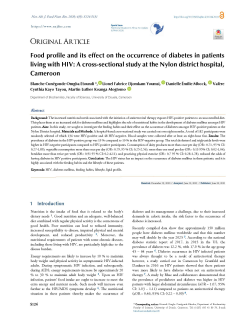Main Article Content
Food profile and its effect on the occurrence of diabetes in patients living with HIV: A cross-sectional study at the Nylon district hospital, Cameroon
Abstract
kground: The increased nutritional needs associated with the initiation of antiretroviral therapy exposes HIV-positive patients to an uncontrolled diet. This places them at an increased risk for diabetes mellitus and highlights the role of nutritional habits in the development of diabetes mellitus amongst HIV patients. Aim:In this study, we sought to investigate the feeding habits and their effect on the occurrence of diabetes amongst HIV-positive patients at the Nylon District hospital. Materials and Methods: A hospital-based cross-sectional study was carried out over eight months. A total of 182 participants were randomly selected of which 134 were HIV-positive and 48 HIV-negative. Blood samples were collected after at least an eight-hour fast. Results: The prevalence of diabetes in the HIV-positive group was 19 % compared to 10 % in the HIV-negative group. The total cholesterol and triglyceride levels were higher in HIV-negative participants compared to HIV-positive participants. Consumption of dairy products more than once per day (OR= 0.71, 95 % CI: 0.27-1.89), vegetable consumption more than once per day (OR= 0.79, 95 % CI: 0.25-2.56), more than one meal per day (OR= 0.13 95% CI: 0.02-1.04), breakfast more than twice per week (OR= 0.91 95 % CI: 0.2-4.11), and practicing physical exercise (OR= 0.7 95 % CI: 0.28-1.78), reduced the odds of having diabetes in HIV positive participants. Conclusion: The HIV status has an impact on the occurrence of diabetes mellitus in these patients, and it is highly associated with the feeding habits and the lifestyle of these patients.







